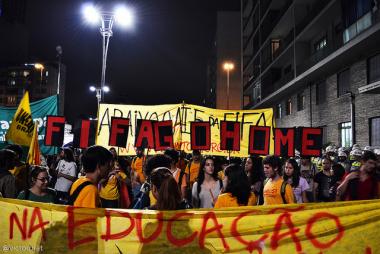
The 2014 World Cup arrived in Brazil amidst a strong opposition. During the opening ceremonies on June 12, protests and police violence shared headlines with the latest sports news in numerous Brazilian cities and the world. Amidst popular assertions of freedom to assemble and political expression and in context of the upcoming presidential elections in October, Brazil is experiencing a politicized sporting event of unprecedented proportions.
Contrary old notions that associate mass entertainment to depoliticization, voices on the street—vocal since mass protests shook the country in June of 2013–found cohesion in opposition to the World Cup. Soccer's popularity in Brazil creates a space where the attention is focused on the smallest details of the event's organizing, and generates a political and cultural movement that manifests in opposition to the events very realization.
After a cycle of unprecedented economic growth, amplified by policies leaning towards consumerism, and a recent expansion of social improvements, Brazilians have demonstrated dissatisfaction with the state of basic services. They argue that the $11 billion spent in preparation for the event could have been better applied to other sectors. Critics argue that the government's priorities and enthusiasm in organizing the cup do not mirror the way in which it has provided basic necessities such as health, education and public transport. A majority opinion in the polls suggests that, all told, hosting the cup was not positive overall for Brazil, and existing social movements no longer find traction with their one-time allies in the Worker's Party (PT).
There is a current of criticism in the streets since last June that see corruption and unwelcome state intervention in the local organization of the tournament. These arguments come from political sectors that aim to see the current Worker's Party government defeated in the upcoming presidential elections in October. On closer inspection, the voices rallying around the #NãoVaiTerCopa slogan (there will be no cup) reject dominant logic in mainstream politics, with it's emphasis on mega-projects and economic development, because these are invariably accompanied by pervasive inequality and violence inflicted upon minorities and poorer populations. The combination of massive commercial deals, media spectacle, police intervention, and patriotic—even nationalist—discourse surrounding the cup stands in stark contrast with reports of runaway costs and embezzlement; forced displacement of citizenry to accommodate the event; and unkept promises regarding infrastructure improvements for cup host cities.
There was no shortage of those who would call those who campaigned in opposition to FIFA's "party" as "vandals" and "terrorists," claiming that this opposition works against the national interest and harms the country's image in the world stage and its ability to attract outside investment. Conversely, some factions in opposition to the cup give rise from wounded national pride criticizing the way in which national sovereignty subjugated itself to the mandates of international corporations with immense profits. At the same time a larger global movement coalesced in response to the model, promoted by FIFA, targeted at emerging nations such as Russia, Brazil and South Africa, in which soccer and big business commingle in an enterprise to open up profitable new markets.
Certain critiques surrounding inequities in Brazilian politics not with an eye not FIFA, but rather towards the governing Worker's Party (PT) and it's allies, who have been in power for over a decade. Those posing this opposition represent a new generation of political actors who take to the streets, reject electoral politics and entrenched power, and broadly claim a pervasive lack of representation. With broad and varied political horizons, these newer players are known for creative expressions of revolt, a relatively young demographic, and an affinity towards horizontalism and self organization. Those rallying around the slogan #NãoVaiTerCopa (#NoHabráMundial #NoWorldCup #StopWorldCup #OccupyWorldCup) criticize the image of Brazil as a global power, an image that the Brazilian government hopes to project by organizing of the World Cup.
This protest campaign manifests as a plan to boycott FIFA's World Cup, but also revolves around the work of popular committees with positive proposals seeking not to prevent the World Cup's realization per se, but rather leverage this opportunity to achieve concrete proposals and fulfill specific demands. First and foremost they denounce the consequences of the project, from the large numbers of dead laborers during the stadium construction, to the spread of the underage sex trade, runaway costs, backhanded dealing in the planning process, and widespread displacement of citizens to make room for stadium projects. They also call out the violation of the constitutional rights to assemble and housing, which are often disproportionately repressed during these events.
Over the course of a few months the popular mobilizations gave rise to new slogans "Se não tiver direitos não vai ter copa" ("If there are no rights, there will be no cup"); "Copa para quem" ("World Cup for who?"), "Copa com Lutas" ("Cup with Struggle"), "Copa sem Povo, Estamos na Rua de Novo" ("Cup without the people, we're in the streets again"). In a moment of creative ebullience social demands and political positioning from myriad horizons are being openly discussed on the streets in a hereto unforeseen fashion during the realization of the World Cup.
With the World Cup ongoing, it isn't so much the event's realization or the way in which it was organized is not where the crux lies. Besides timely demands for compensation for negatively affected families, the movement against the cup achieves confluence with sentiments and grievances being aired on the streets since July 2013. This movement stands in contrast with existing currents of criticism agains political corruption taking focusing on the upcoming elections. It doesn't see answers in electoral politics, or alternative parties, but rather explores distinct paths that combine new approaches and modes of discussion, debate, negotiating power structures, organizing, and struggle as well as new proposals and building of new political structures for a new Brazil.

